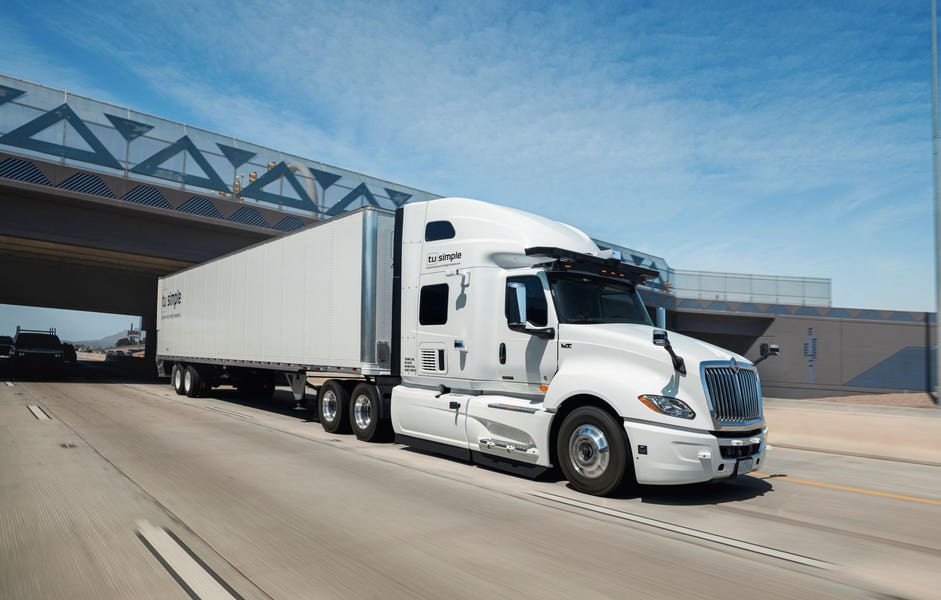Robot truck developer TuSimple is considering selling off its U.S. operations after a rocky year.
TuSimple
The company’s CEO says there’s no firm buyer lined up and that the plan to separate U.S. operations doesn’t arise from pressure related to a CFIUS review.
TuSimple, a leading developer of autonomous driving technology for heavy-duty trucks, is aiming to sell its U.S. business. The move to find a buyer is part of a year-long upheaval marked by management turmoil, the replacement of its board, the loss of a key partnership and accusations of improperly sharing sensitive technology with a Chinese startup.
The San Diego-based company, which listed shares on Nasdaq in 2021, said its board unanimously agreed to a plan that includes fully separating its larger U.S. operations from trucking programs in China and Japan, hiring Perella Weinberg Partners as a financial advisor on the matter.
“You can think of TuSimple today as a holding company that’s publicly traded, that has cash and two very distinct businesses, one in Asia Pacific … and one in the U.S.,” CEO Cheng Lu told Forbes . “Both sides have independent engineering teams, management teams, back office functions, source code and software development.”
Lu said a sale of U.S. operations would benefit shareholders, and denied that the company’s plans to sell are the result of pressure related to a review of TuSimple by the Committee on Foreign Investment in the United States, or CFIUS.
There’s no specific buyer lined up for a deal as of yet. But if there is a sale, “this would be the most meaningful step in terms of mitigating any future national security concerns CFIUS could have,” Lu said. “If you don’t even have R&D in the U.S., then there is no national security concern.”
TuSimple’s early funding by China-based investors initiated a CFIUS review when it went public in 2021. Early this year, a Wall Street Journal article claimed the company faced potential “ espionage charges ” related to sharing automated driving technology and other sensitive information with Hydron, a Chinese hydrogen truck startup created by TuSimple cofounder Mo Chen, citing an unidentified source. TuSimple has denied any wrongdoing in the matter. That allegation came after the company fired former CEO and cofounder Xiaodi Hou last year, the architect of its technology. Following his termination, Hou and Chen fired TuSimple’s board last November. Hou was also removed from the company’s board but remains a shareholder.
“As of our last disclosure we had close to a billion dollars of cash. We’re not running out of cash.”
The company’s advances in automating heavy trucks and a string of shipping partnerships have positioned it as the fastest-moving player in the nascent robot truck market, outpacing even self-driving leader Waymo. Its market value surged following the IPO two years ago, with shares once trading for more than $62, before problems arose. Early last year one of its automated trucks veered and crashed into a highway median, creating new and unwanted scrutiny over its technology. Then late last year, Navistar, a giant in heavy truck manufacturing, ended a development partnership with TuSimple to make semis integrating its AI-enabled software and sensors. TuSimple shares currently trade for about $2.20.
Autonomous driving, which seemed to be on the cusp of widespread commercial use five years ago, has proved to be more challenging to perfect than many of its advocates anticipated. Last year Ford and Volkswagen eliminated their joint venture Argo AI, despite having poured billions of dollars into it. Earlier this year Embark, another promising robot trucking startup, announced plans to essentially liquidate its operations and eliminate staff.
(For more on Hou and TuSimple, see, Robo-Rigs: The Scientist, The Unicorn and The $700 Billion Race To Create Self-Driving Semi-Trucks )
TuSimple’s Lu said a sale of the U.S. business isn’t essential at the moment but would be beneficial for the right buyer.
“As of our last disclosure we had close to a billion dollars of cash. We’re not running out of cash. This is a part of our thinking about how to maximize shareholder value long-term,” he said. The company’s U.S. unit “has what I would argue is world-leading technology in self-driving trucks, especially on the virtual driver side, the simulation. We’ve spent a ton of money, over $1 billion in development so far.”
“In the hands of the right buyer with the right synergies, I think that could even benefit the technology development more.”

